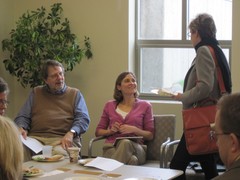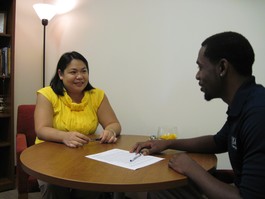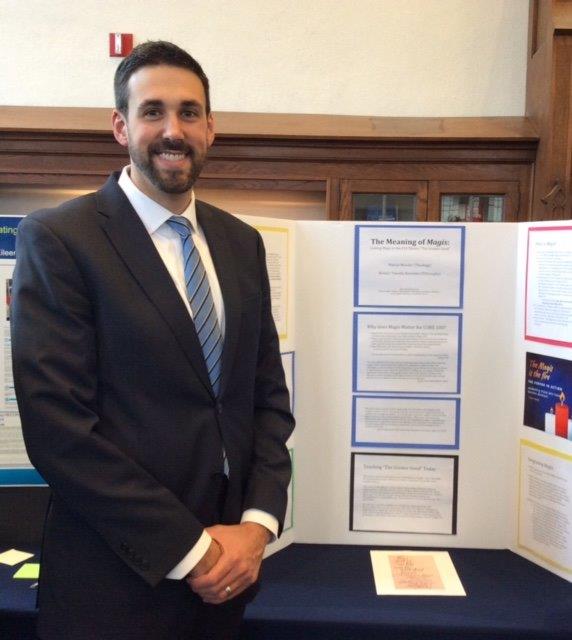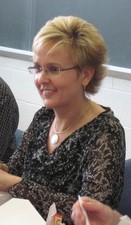Quick Links:
- Christian Sexual Ethics (THEO 313)
- The Four Weeks of the Spiritual Exercises in THEO 111
- Theological Foundations (THEO 111)
Christian Doctrine Today (THEO 290) - Intellectual Conversion as Liberation
- The Meaning of Magis: What Magis Adds to the FYS Theme, the Greater Good
- Theological Foundations (THEO 111)
Jesuit Theology and Spirituality (THEO 236) - Ageless Insights for Distracted Minds and Bodies: Teaching the Ignatian Habits of Reflective Discernment for Future Busy Professionals Through Online Environments
- Ecumenical Examen as a Tool for Ecological Conversion
Christian Sexual Ethics (THEO 313)
Jennifer Beste, Ph.D.
Mentor: Lisa Close-Jacob, Ph.D. (Biology)

This course introduces students to the method and fundamentals of Christian ethics and explores the moral visions, principles and teachings of the Christian tradition as they relate to sexuality. By the end of the course, students are expected to discern and articulate their own Christian sexual ethic.
Mission-Driven Component:Since I teach theological ethics courses, my objective is to incorporate Jesuit values into my teaching. I seek to develop further their abilities to:
1. reason critically and think creatively
2. communicate effectively
3. integrate knowledge with experience toward wisdom, insight, and understanding
4. promote justice and be morally sensitive to the needs of the most marginalized and poor in society
5. appreciate human diversity and inclusiveness
6. seek to find the presence of God in all things.
After reading and reflection about the Ignatian vision and values, I integrated two new components to my sexual ethics course this spring.
First, I emphasized the relationship between the Jesuit value of social justice and specific sexual ethics issues. We began the course by analyzing the concept of justice and how it relates to sexual ethics. Students read about Foucault and how his insights help us analyze issues of justice involved in sexual ethics, such as the historical construction of black sexuality by dominant whites from slavery to the present, the portrayal and treatment of women and children in society, and Christian church's stance towards gay and lesbian persons.
Second, I am challenging students to reflect more explicitly and deeply on their moral character and become more critical of their individual gendered and sexual identity. A new assignment I have designed challenges them to analyze how their gendered identity has been constructed by religious and cultural gender norms. Students will write about how they conform to gender characteristics of masculinity or femininity. They will address the following questions: Are there any gender characteristics that they have internalized that 1) may actually be harmful to themselves and their ability to be a whole person, 2) may hinder their capacity to sustain intimate, healthy relationships, and 3) may cause them to treat others unjustly? Students who identify and struggle with harmful gender characteristics will discern ways to change and resist gender norms. Such analysis of gender will be crucial when addressing issues of justice between men and women addressed later in the course.
The Four Weeks of the Spiritual Exercises in THEO 111
Karen B. Enriquez, Ph.D.
Mentor: Chris Anderson, Ph.D. (History)
Course Description 
Theo 111 is the introductory course in theology that all students are required to take. In this course, students are introduced to theology as a mutually critical dialogue between human experience and religions. Moreover, as part of the Ethics/Religion and Society (E/RS) focus of Xavier's core curriculum, this course asks students to engage in critical, theological reflection on ethical and/or religious questions of social significance, using human experience and religious traditions as resources to address these issues.
Read full text of "The Four Weeks of the Spiritual Exercises in THEO 111"
Theological Foundations (THEO 111)
Christian Doctrine Today (The 290)
Edward Hahnenberg, Ph.D.
Mentor: Ed Cueva, Ph.D. (Classics)
THE ROLE OF EXPERIENCE and MODELS OF MINISTRY
THEOLOGICAL FOUNDATIONS (THEO 111)
Course Description (Spring 2005)
This course introduces students to theology as an academic discipline by exploring the various ways individuals and communities articulate their experience of the divine. Working primarily from a Christian perspective-in dialogue with other views-we will study four related areas: (1) the Hebrew Bible, (2) selected world religions, (3) the Christian understanding of Jesus, and (4) the relationship of theology to current social and ethical issues.
Read full text of "Theological Foundations & Christian Doctrine Today"
Intellectual Conversion as Liberation
Martin Madar, PhD
Mentor: Thomas E. Strunk, PhD (Classics)
Project Description
The Ignatian Mentoring Program provided me with an opportunity to approach my Theological Foundations course (TF) in a broader way than I had before. Guided by Tom Strunk, a colleague the Department of Classics and Modern Languages, I read widely from A Jesuit Education Reader. From the readings and from my conversations with Tom I deepened my understanding of the principles of Ignatian pedagogy and found the inspiration for what I wanted to do for the program.
Read full text of "Intellectual Conversion as Liberation"
The Meaning of Magis: what Magis Adds to the FYS Theme, the Greater Good

Marcus Mescher
Mentor: Timothy Brownlee
See a published scholarly version of this paper here and a popular version, Learning and Living Magis.
Introduction
Since its inaugural semester in fall 2015, CORE 100 (the First Year Seminar at Xavier University) has afforded faculty the opportunity to connect an area of interest to the common theme, the "Greater Good." But what does the Greater Good mean? Some might use language of authentic or integral human flourishing. Others might think of this term in light of the principle of the "common good" in Catholic social teaching. The website [1] that outlines course goals for faculty states, "The Jesuit tradition of Magis invites us to work in a spirit of generous excellence-to consider the greater good in all that we do, including our academic work. Faculty from across the university are encouraged to interpret this theme from their disciplinary and personal perspectives" and suggests that faculty encourage students to attend a campus event, read texts, or adopt a project that explores the "Greater Good." While it is fitting for faculty to explore and adopt the "Greater Good" in their own way, if we do not share a common understanding of the meaning of this phrase, we risk reducing it to platitudinous lip service. This would betray the Jesuit identity and mission that animate the work we do, especially as it relates to the intellectual, moral, and spiritual/religious formation of first year students.
Read full text of "The Meaning of Magis: what Magis Adds to the FYS Theme, the Greater Good"
Theological Foundations (THEO 111)
Jesuit Theology and Spirituality (THEO 236)
Chris Pramuk, Ph.D.
Mentor: Ginger McKenzie, Ph.D.
I. Using Music and Poetry to Teach the Whole Person 
Theological Foundations (THEO 111)
Course Description (Fall 2008/Spring 2009)
This course introduces students to the academic study of theology by reflecting on the mysteries of human life and the divine dimension of reality. We approach the subject through many lenses: historical and critical analyses, sacred scripture, literature, and science; through art, poetry, film, and music; and inevitably, through the lens of our own experiences, questions, and personal histories as human beings. By exploring religious faith and theological questioning as a universal dimension of human life on the planet, this class provides a foundation for a deeper personal engagement with Catholicism and global religious traditions in general.
Read full text of "Theological Foundations & Jesuit Theology and Spirituality"
Ageless Insights for Distracted Minds and Bodies:
Teaching the Ignatian Habits of Reflective Discernment for Future Busy Professionals Through Online Environments
 Kristine Suna-Koro, PhD
Kristine Suna-Koro, PhD
Mentor: Carol L. Winkelmann, PhD (English)
Acknowledgments
I extend my appreciation to IMP and gratitude to my mentor Dr. Winkelmann for her terrific support during this project. This project is dedicated in honor of my dear colleague and friend Dr. Jennifer Beste, 2010 Conway Fellowship Recipient.
Project description
It is an open secret that in the present culture of ruthless efficiency a premium it put on our productivity and accelerated performance. Technological revolution has been a mixed blessing: we have ample tools to be connected and interact with one another even across the globe twenty-four hours a day, every day. Multi-tasking is increasingly perceived as a non-negotiable demand for our high-tech minds and careers. Technological developments have taught us to constantly multitask. What is particularly important in academic settings is the virtually required ability to learn in distracting environments. The skills of gathering large amounts of information from electronic media are rapidly developing. Certain tasks can be performed much faster using our ubiquitous technology. And yet, on the other hand, in this context distraction emerges as the pivotal nemesis of self-knowledge, genuinely productive learning as well as reflective analytical skills alongside thoughtful action and decision-making capabilities.
Read full text of "Ageless Insights for Distracted Minds and Bodies"
Ecumenical Examen as a Tool for Ecological Conversion
Christine Thomas, Assistant Professor of Hebrew Bible
Mentor: Lisa Ottum, Ph.D. (English)
A Theological Response to the Environmental Crisis:
The context of my work in the Ignatian Mentoring Program was the vision of the Theology Department for a renewed THEO 111: Theological Foundations course. Through a collaborative process of discernment and discussion in 2019, the Department articulated 7 student learning outcomes for THEO 111. Among these were the one which is the focus of my project: that students be able to formulate a theologically informed response to the environmental crisis. We collectively agreed that a primary text for this work would be Pope Francis’ encyclical On Care for Our Common Home: Laudato Si’.
Pope Francis powerfully frames the challenge facing us both as human beings on this planet and as educators in responding to the environmental crisis:
Read full text of "Ecumenical Examen as a Tool for Ecological Conversion"
To provide feedback, please email: jesuitresource@xavier.edu
Jesuitresource.org is developed by The Center for Mission and Identity at Xavier University with support from the Conway Institute for Jesuit Education. Learn more about Jesuit Resource.
